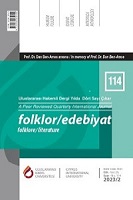Between Intangible Cultural Heritage and Folklore
Between Intangible Cultural Heritage and Folklore
Author(s): Dan Ben-AmosSubject(s): Museology & Heritage Studies, Customs / Folklore, Ethnohistory, Oral history, Social history, Cultural Anthropology / Ethnology, Culture and social structure
Published by: Uluslararası Kıbrıs Üniversitesi
Keywords: Folklore; cultural heritage; intangible cultural heritage;
Summary/Abstract: During the last half a century, the concepts of folklore and heritage went respectively through parallel but inverted courses. I think there are serious problems in the mating of “Folklore” with “Intangible Cultural Heritage” and the differences between them are unrelated to age or generation gaps but are inherent conceptual incongruities between the two ideas. Shortly after Dorson declared folklore as “one of the remarkable stories of the present academic scene” (1970), folklore’s wheel of fortune began to turn backward academically while its star rose on UNESCO horizons, emerging in tandem with the tangible and intangible heritage that has solidified as “Intangible Cultural Heritage” (ICH). Toward the end of the twentieth century, the term’s use took off, appearing in handbooks, anthologies, monographic essays, and numerous articles. “Intangible Cultural Heritage,” seemed the right resolution for the folklore crisis, not only in the United States and Germany but in all the nations that UNESCO unites, and folklorists flocked to it like a moth to the flame. At first glance, the mutual attraction seemed perfect. What could have been more attractive to folklore, political freedom, and cultural liberation after many years of suppression, and yet had the full support of states and their political leaders? But the harmonious relations between Intangible Cultural Heritage and Folklore were short-lived because their inherent incompatibility could not sustain this union. The packaging of traditional culture for modern consumers deflates it from the symbolic values of these words and objects within their communities. when heritage begins, tradition ends. In this way, a society abdicates its collective social and cultural identity and turns itself into a staged show. There is no way but to conclude that with such a significant degree of separation, Intangible Cultural Heritage is not a mate for the discipline of folklore.
Journal: Folklor/Edebiyat
- Issue Year: 29/2023
- Issue No: 114
- Page Range: 347-386
- Page Count: 40
- Language: English

